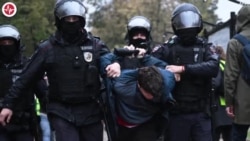Russian President Vladimir Putin’s order of a “partial mobilization” is failing a reality check, with local commissariats apparently drafting men with zero military background or experience and protests erupting across the country.
Putin ordered the call-up last week amid Russia’s chronic military setbacks in Ukraine, saying it was aimed at reservists and specialists who’d previously served in the military. But already, the Kremlin has had to clarify who’s being called up for duty while prospects are fleeing by the tens of thousands.
On September 21, Putin said:
“I repeat, we are talking specifically about partial mobilization. That is, only citizens who are currently in the reserve will be subject to conscription. And above all, those who served in the armed forces, have certain military specialties and relevant experience.”
That turns out to be false.
Reports from across Russia paint a picture of chaos, panic, and anger, with the military commissariats and local authorities hectically trying to reach numeric targets from Moscow.
The Russian independent news site Mediazona reported:
“Among [conscripts] are graduates of military medical universities, as well as surgeons, anesthesiologists and traumatologists who graduated from civilian medical universities. Across the country, doctors are already receiving subpoenas from military registration and enlistment offices.”
One, an oncologist, said:
“If they call me, of course, I will pack up and go, because I can help our guys. I will help save lives. The ‘do no harm’ dogma that has been taught to me in medicine for years will work. If I have to shoot a person, an enemy, I'm not sure I can do it. I don't want to sacrifice my principles for this horror.”
News reports said one man set himself on fire in his refusal to participate in the fighting. Another allegedly shot and wounded a commander at a military commissariat, and dozens of commissariats were set ablaze in protests across the country.
The independent Russian rights watchdog OVD.info reported that as of September 26, the riot police had detained 2,366 protesters in anti-mobilization rallies.
Russian authorities have disproportionally targeted ethnic minorities and protesters for conscription, The Washington Post reported on September 23. In the Russia-occupied Ukrainian Crimean Peninsula, indigenous Crimean Tatars amount to 90% of conscripts, the rights group CrimeaSOS reported.
Russian occupational authorities in Crimea called the reports “fake” and claimed that conscription is “in proportion to the ethnic composition of the peninsula population.”
Protests took a violent turn in the North Caucasus Republic of Dagestan, where women have been clashing with the police and blocking the roads to prevent the convoys with drafted family members from leaving their towns and villages.
Local newspaper Chernovik, in the Dagestani capitol, Makhachkala, published videos showing police beating the protesters and firing live ammunition above the crowd.
Protesters in Kabardino-Balkaria met with the republic’s authorities on September 26. They said “children” who have no past military service or training were being drafted.
In the videos from the rally in Nalchik, posted on Facebook by Circassian activist Martin Kochesoko, one woman could be heard telling the representative of the local government, “You are taking the children who don’t even know how to shoot!”
In another video, the woman says, “You know well what kind of rifles these children are being given!” Another woman adds, “You know very well that these kids are cannon fodder. They will not come back alive!”
Citing sources inside the Federal Security Service (FSB), the independent Russian newspaper Novaya Gazeta-Europe reported that some 261,000 men left Russia in the days after Putin’s mobilization announcement.
Some Russian lawmakers suggested closing the borders to prevent the exodus of men, but Putin’s press secretary, Dmitry Peskov, said such options are not being considered.
Georgian authorities reported that Russia has increased its military presence at the border, where large crowds of mostly young men have gathered trying to cross into Georgia on foot.
The Russian independent newspaper The Insider reported that some 115,000 Russian citizens crossed into Georgia in the past week. An aerial video showed a line of backed-up vehicles snaking some 18 kilometers at the Georgian border.
Ukrainian President Volodymyr Zelenskyy said on Sunday that Russia’s “criminal mobilization” is an “imperial policy” to “physically destroy” indigenous people.
Amid the dissent, Putin enacted new enforcement measures. On September 24, he signed a package of five laws introducing criminal penalties for resisting or escaping military conscription, defection, loss or damage of military equipment, and surrender.
Three laws impose 10 years imprisonment for not showing up when drafted, desertion,“refusing to participate in military combat actions,” and surrendering to the enemy.
One law makes the mobilization itself an “aggravating circumstance” in any crime committed during the “partial mobilization and special military operation,” including “illegal public gatherings” and “discreditation of the military.”






